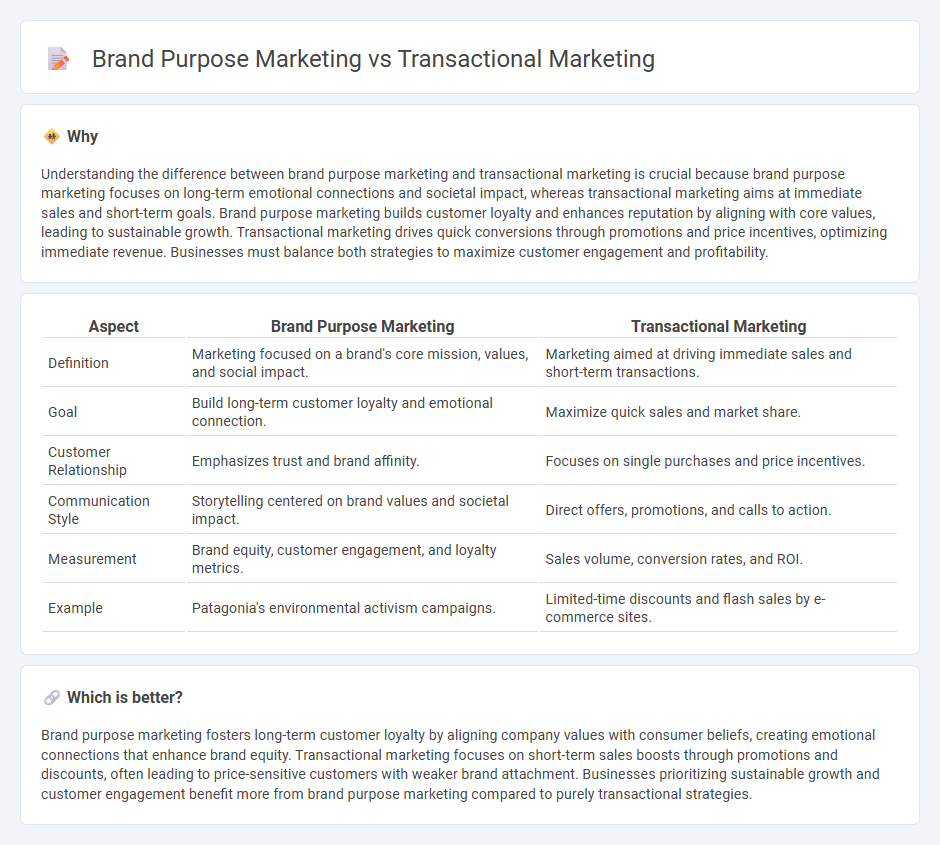
Brand purpose marketing focuses on creating emotional connections by aligning a company's mission with social values, enhancing brand loyalty and long-term customer engagement. Transactional marketing prioritizes immediate sales and short-term profit through promotions, discounts, and direct calls to action. Discover the strategic advantages of each approach to optimize your marketing efforts.
Why it is important
Understanding the difference between brand purpose marketing and transactional marketing is crucial because brand purpose marketing focuses on long-term emotional connections and societal impact, whereas transactional marketing aims at immediate sales and short-term goals. Brand purpose marketing builds customer loyalty and enhances reputation by aligning with core values, leading to sustainable growth. Transactional marketing drives quick conversions through promotions and price incentives, optimizing immediate revenue. Businesses must balance both strategies to maximize customer engagement and profitability.
Comparison Table
| Aspect | Brand Purpose Marketing | Transactional Marketing |
|---|---|---|
| Definition | Marketing focused on a brand's core mission, values, and social impact. | Marketing aimed at driving immediate sales and short-term transactions. |
| Goal | Build long-term customer loyalty and emotional connection. | Maximize quick sales and market share. |
| Customer Relationship | Emphasizes trust and brand affinity. | Focuses on single purchases and price incentives. |
| Communication Style | Storytelling centered on brand values and societal impact. | Direct offers, promotions, and calls to action. |
| Measurement | Brand equity, customer engagement, and loyalty metrics. | Sales volume, conversion rates, and ROI. |
| Example | Patagonia's environmental activism campaigns. | Limited-time discounts and flash sales by e-commerce sites. |
Which is better?
Brand purpose marketing fosters long-term customer loyalty by aligning company values with consumer beliefs, creating emotional connections that enhance brand equity. Transactional marketing focuses on short-term sales boosts through promotions and discounts, often leading to price-sensitive customers with weaker brand attachment. Businesses prioritizing sustainable growth and customer engagement benefit more from brand purpose marketing compared to purely transactional strategies.
Connection
Brand purpose marketing and transactional marketing are interconnected through their shared goal of driving customer engagement and sales. Brand purpose marketing builds long-term loyalty by aligning with consumers' values and creating emotional connections, while transactional marketing focuses on immediate sales and promotions to boost short-term revenue. Combining these strategies enables businesses to foster trust and incentivize purchases, enhancing overall marketing effectiveness.
Key Terms
**Transactional Marketing:**
Transactional marketing centers on driving immediate sales through promotions, discounts, and limited-time offers that prompt quick customer action. This strategy prioritizes short-term gains by targeting specific purchase behaviors and boosting conversion rates. Explore how transactional marketing can accelerate your business growth.
Sales Promotions
Transactional marketing centers on immediate sales boosts through targeted sales promotions designed to drive quick customer action and increase short-term revenue. Brand purpose marketing leverages promotions to reinforce a brand's core values, fostering long-term customer loyalty and emotional connection beyond the transaction. Explore how aligning sales promotions with brand purpose can transform marketing strategies and enhance sustainable growth.
Point-of-Sale
Transactional marketing centers on driving immediate sales at the Point-of-Sale through promotions, discounts, and limited-time offers, aiming for quick customer conversion. Brand purpose marketing, by contrast, leverages the Point-of-Sale to reinforce the brand's core values, creating emotional connections that foster long-term loyalty and advocacy. Explore how integrating brand purpose into Point-of-Sale strategies can elevate customer engagement and boost sustainable growth.
Source and External Links
Transactional Marketing: The Key to Immediate Sales Growth - Transactional marketing focuses on driving one-time purchases through techniques like product bundling, bulk discounts, cross-selling, and upselling to increase immediate sales revenue rather than fostering long-term customer relationships.
What Is Transactional Marketing? - Examples & Strategies - Feedough - This marketing strategy prioritizes closing individual sales quickly using methods such as upselling, cross-selling, bundling, bulk discounts, and targeted sales promotions, aiming for volume rather than lasting customer engagement.
Transactional Marketing vs Relationship Marketing - Meltwater - Transactional marketing centers on maximizing the number and profitability of individual sales transactions by leveraging product, price, place, and promotion strategies without focusing on customer retention or repeated purchases.
 dowidth.com
dowidth.com